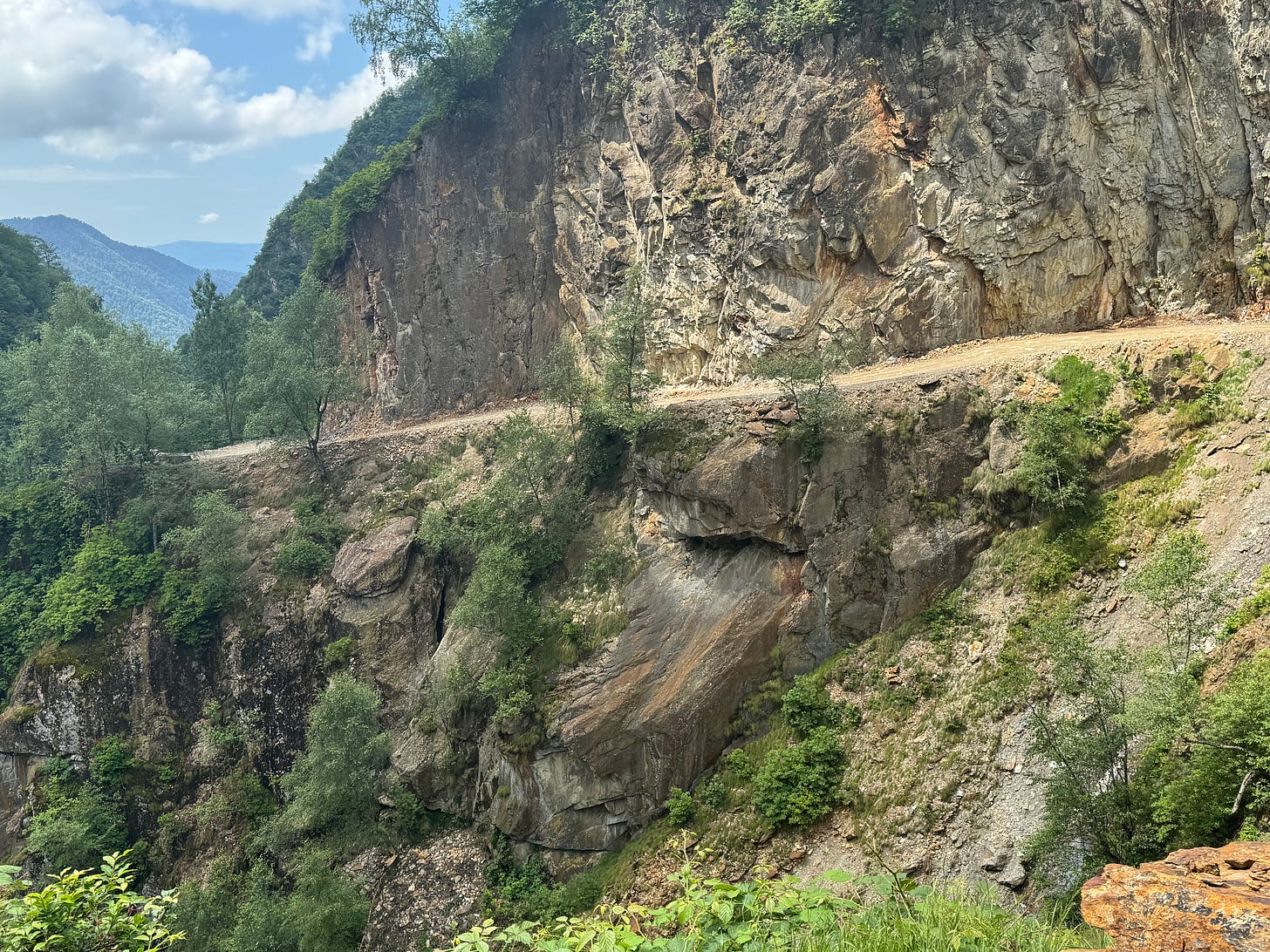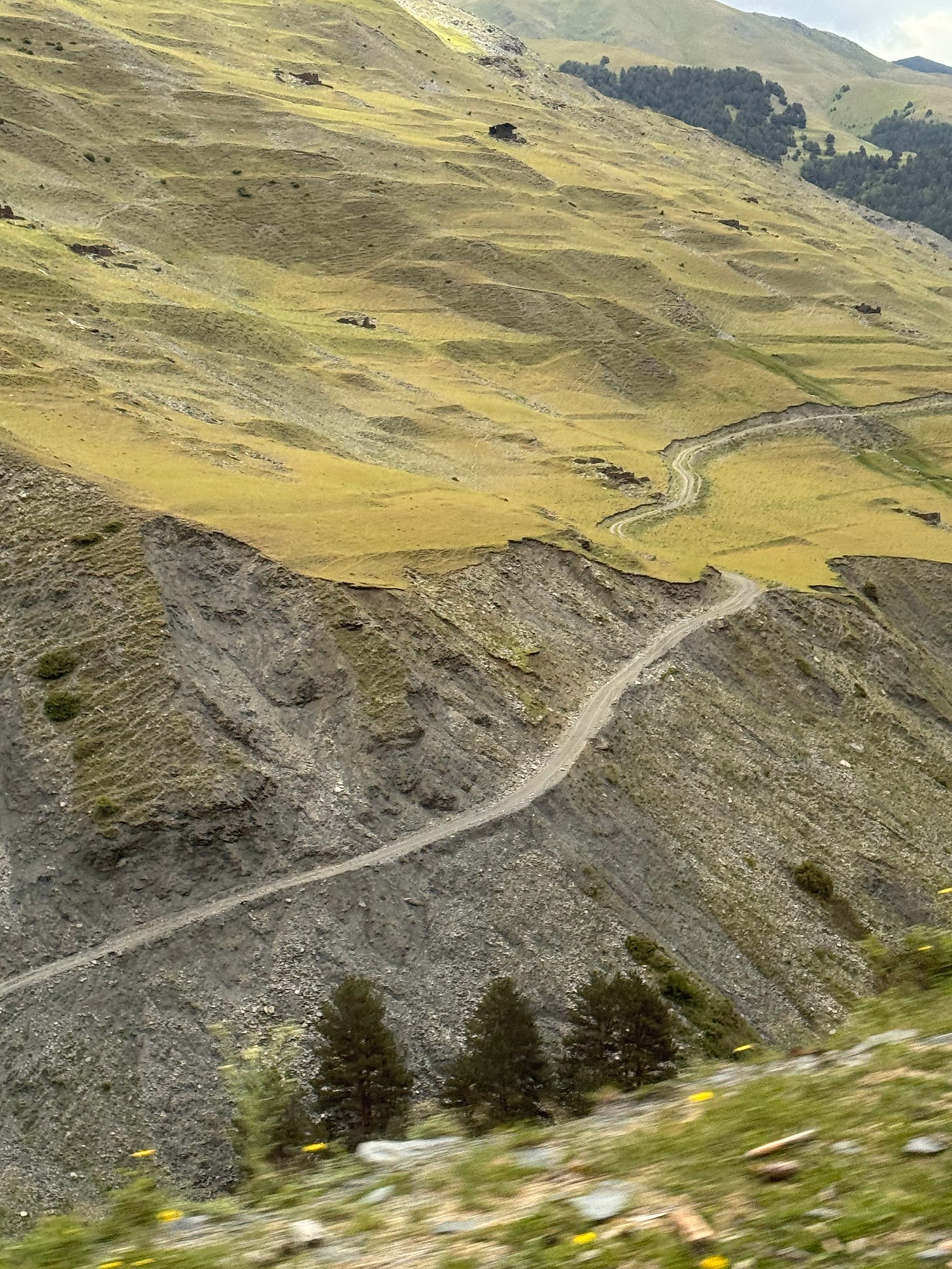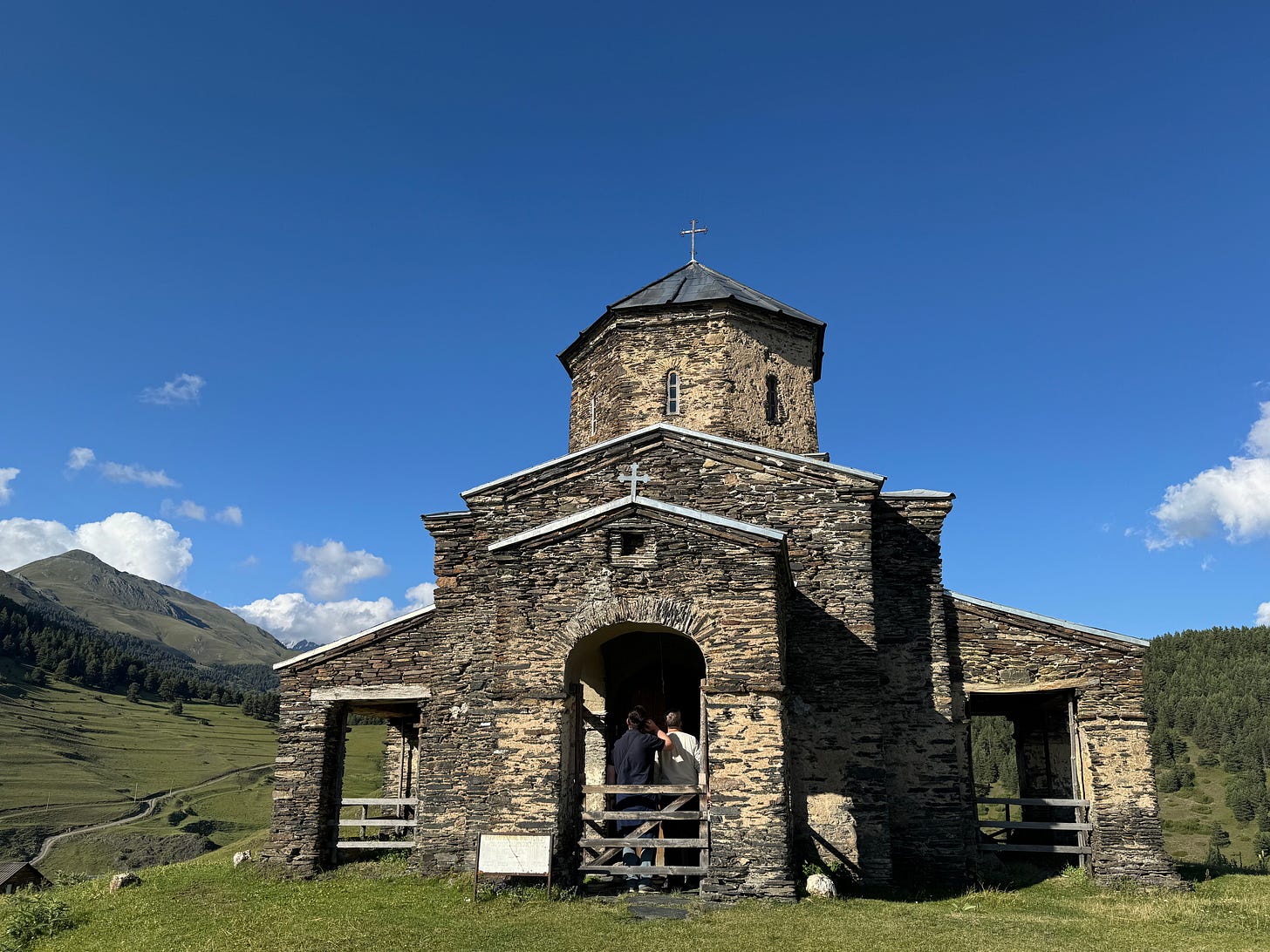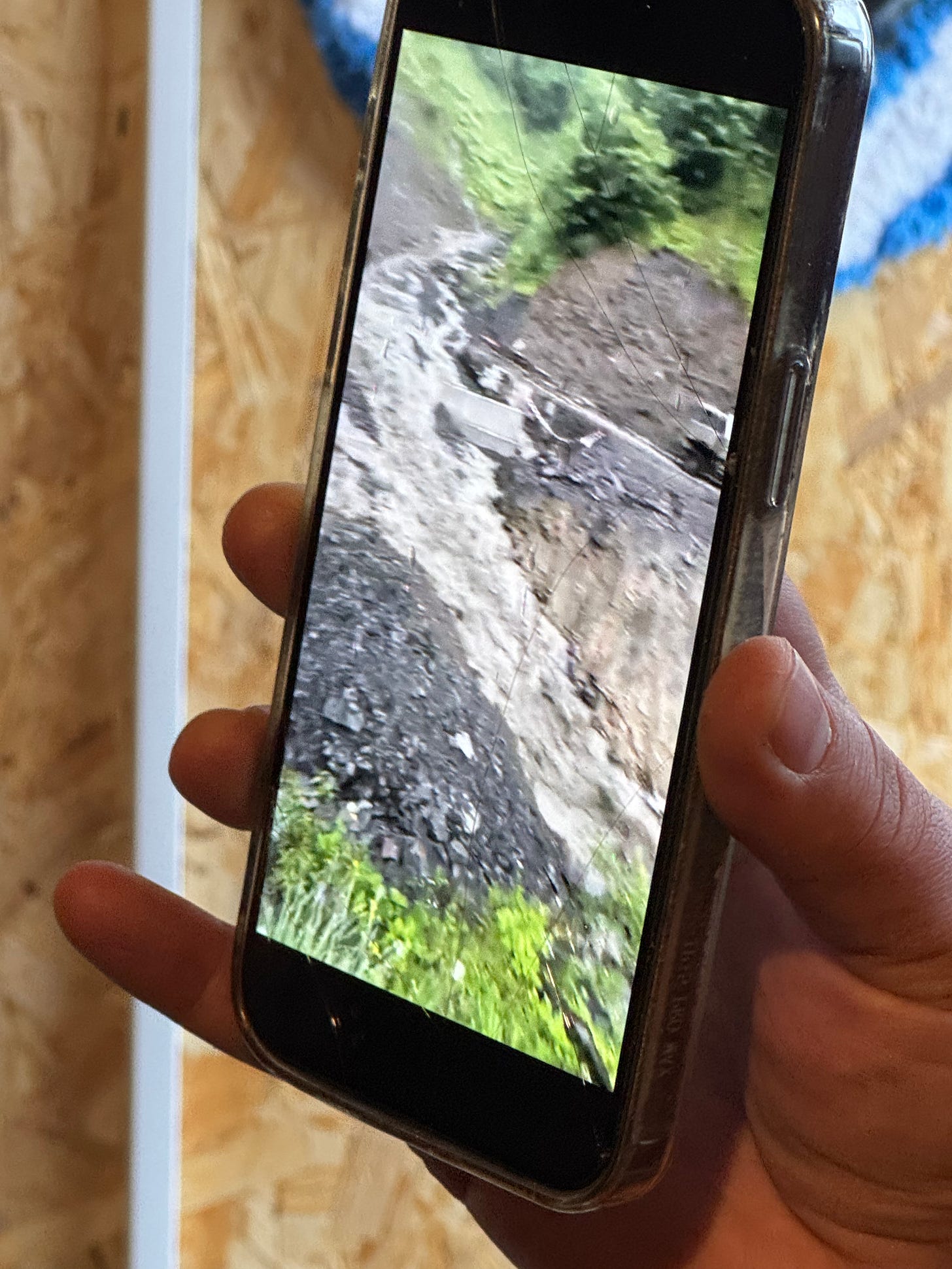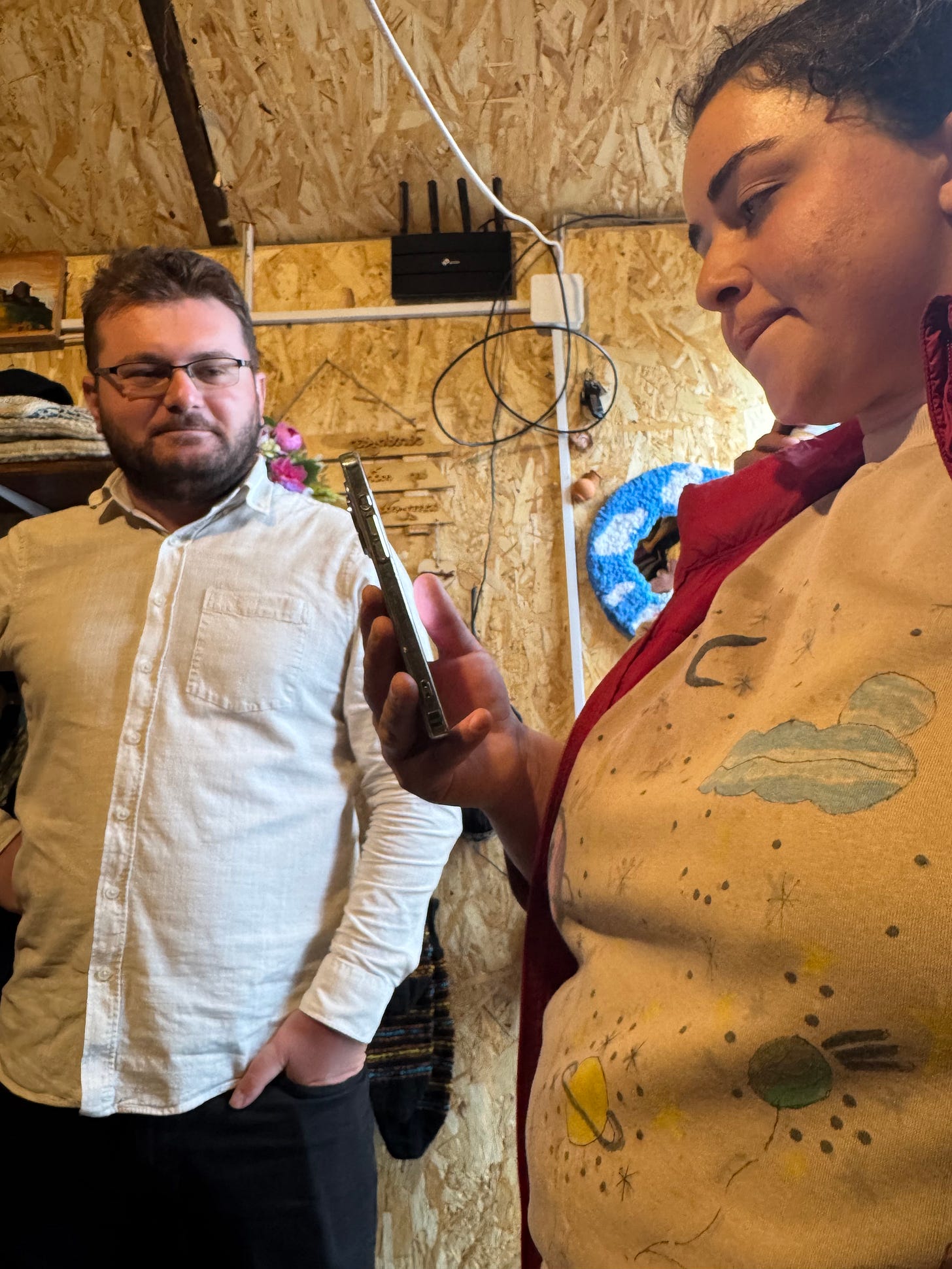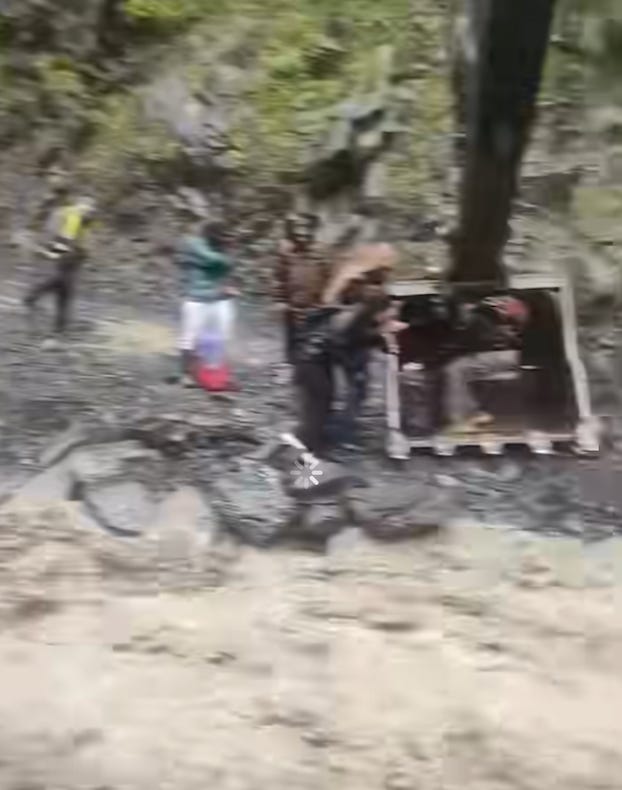Part 1 of 4
Tusheti, Republic of Georgia, July 1-5, 2025
This would be my fourth time traversing the Abano Pass, a 45-mile stretch of narrow, rutted, winding ribbon of dirt considered among Europe’s five most dangerous roads. On average, 10-12 people a year die trying to drive across it, and numerous roadside memorials stand in sad testimony.
“Would be?” Read on.
Situated deep in Georgia’s Caucasus mountains, the road clings to cliff sides and carves its way through deep gorges. The tread is narrow, rough, rutted and unpredictable. Turns are tight, blind and often steep–as much as a 17 percent grade. Oncoming vehicles and herds of sheep make for frequent encounters.
When the Soviets built the road in 1978, speedy construction trumped safety. There’s nary a guardrail to be seen. Most vehicles are four-wheel drive with the steering wheel on the right, all the better to see how close the driver is to the edge of the road. A miscalculation could result in a drop of several hundred feet.
So yes, it’s my fourth time, and I’m loving it.
Right now, I’m returning from a van tour to Tusheti, a remote mountainous region in Georgia, an independent republic once under Soviet rule. The only way in and out: the Abano Pass.
Mountainous and remote, Tusheti contains a collection of 48 centuries-old villages, many with buildings and customs that date back to medieval times and centuries earlier. The area has been populated since the Bronze Age. They’re distinctive with defensive stone towers, most dating back to the 1600s, some with considerably older origins.
At one time, more than 5,000 people inhabited the region. During the 1940s, the Soviet regime strongly encouraged people to move to the lowlands. In the 1950s, they were forced to move. Restrictions eased in the 1960s and 1970s, but the population saw very little rebound. Some sources put the current number at 400 during the summer months and as few as 20-30 year-round.
Officially, most residents are Orthodox Christians. Most of them, however, incorporate pre-Christian elements of paganism and animism into their belief systems. They view a world where animals, plants and even rocks and rivers possess a soul. It’s vital for humans to interact with their environment accordingly–with respect and reverence.
While there are churches, there are also stone shrines known as khatis. Women are not allowed to approach them. As part of an ancient ritual, sheep are often slaughtered at the khatis, their blood splashed onto the rocks.
We’re not in Kansas anymore, Toto. Or not even Tbilisi.
As I write this, I’m stranded at the top of the Abano Pass, 9,200 feet above sea level, half-way “home” to Tbilisi, Georgia’s capital, where I’ve rented an apartment for two weeks. I’m keeping warm in a hut where Daji, the owner/manager/head cook/barista of a tiny cafe, has added communications and rescue coordinator to her many roles.
“The rain has caused a landslide that has taken out part of the road,” Daji explained a few moments ago. “They can’t try to repair it until the rain stops.”
She lifted her cell phone to show videos a friend had sent of the missing road.
Yup, we may be here for a while.
The hut fills with more and more people, drenched in just the short run from their four-wheelers. Shivering, each enters the hut and is greeted by a warm “Gamarjoba!” The greeting literally means “victory,” Some say it’s a remnant of times when war was common. Now it’s more figurative, wishing success in any battles a person may be facing.
Most of the drivers and guides (typically all male) know each other and share greetings and occasional hugs. Men showing affection toward men is common and welcome here.
Within a half-hour, the hut becomes a polyglot collection of temporary refugees. A family from Lithuania. A couple from France. A trio of vociferous Russians. Even our tour group party of six has representation from the U.S., Iceland, Scotland, South Korea and Spain.
All wonder when they’ll be able to continue to their destinations.
“Take your jackets off, shake off the water and dry it on the wood stove,” our guide, Jonah, urges. “Otherwise, you’ll stay cold even with the stove.”
People bring in food meant to last their trips, and a makeshift buffet forms. A bag of “Mr. Brownie.” Left-over cheese bread. Apricots. Stacks of khachapuri, a type of Georgian cheese-filled bread with origins in the 12th century. I add grapes and cherries I’d bought to the growing stash.
“I lived in America for five years,” one Georgian woman says. “I was never able to find an apricot that tastes like the ones we grow here.”
Daji supplements the shared food with blueberry, banana and raspberry pastries, fresh from the oven. Guests clutch mugs of hot tea and coffee to keep warm.
Daji may be taking in a week’s revenue in one day. Of course, “one day” is an optimistic outlook.
“Where are you from?” follows most greetings. Visitors share their favorite experiences and destinations in Georgia, and Georgians cheer when their regions are mentioned. Georgians tell what region they’re from, and the travelers respond with stories of past or upcoming visits.
Daji checks the wood stove, moves coals around, and adds wood. She stacks other wood beside the store for drying. Without a functioning stove, our time in the hut would be dramatically less comfortable, perhaps even dangerous.
The rain isn’t bad now, but it had been raining torrentially overnight, and it would take hours, perhaps even days for the flow down the mountain sides to subside. And, until that happened, repairs couldn’t even be started.
Members of our assembled group share views from their weather apps and discuss the odds of getting back to Tbilisi today…tomorrow…the next day.
“There is no road there anymore,” Daji says. “It’s a river. Actually, more like a waterfall.”
With no alternate routes, we’re stuck.
A Plan B alternative is mentioned but deemed impractical: The cars stuck on this side could make their way down to the washed-out area. People could then climb into the bucket of a large steam shovel or crane and get swooped over the abyss and past the ruined road to safety. Cars waiting on the other side could drive them to the flatland.
I’ll wait for Plan C. In the meantime, at 9,200 feet, dozens of miles from the nearest village, at least the Wifi is strong, the hut is warm, and the company is cordial.
Jonah confers frequently with Daji, who holds her phone up to show him real-time Facetime videos from the fallen road. He shows the phone to Davit, our superb driver, who smiles but shakes his head. Jonah turns and huddles with our group.
“I don’t think we have a choice,” he tells us. “We need to return to Omalo.”
To be continued…tomorrow


